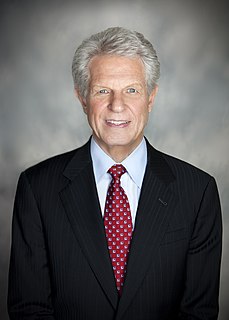A Quote by Kevin Lowe
It is easier to recognize the quality of leadership in the behavior of their followers than it is in the behavior of the leader.
Related Quotes
Often, in a given project team or network, one sees leadership roles shifting among various members at various times. Attempts to fit these into traditional views of "leader" and "follower" don't quite work. It's more like Twitter: the "leader" has "followers" - but the "followers" are empowered to alter the relationship unilaterally, and the "leader" must continually earn the consent of the "followers."
True doctrine, understood, changes attitudes and behavior. The study of the doctrines of the gospel will improve behavior quicker than a study of behavior will improve behavior. Preoccupation with unworthy behavior can lead to unworthy behavior. That is why we stress so forcefully the study of the doctrines of the gospel.
We are not responsible for the behavior of anyone that goes contrary to what we teach, any more than the Pope of Rome or the Archbishop of Canterbury or a religious leader who teaches moral law and values can be charged with the errant behavior of a parishioner or congregant who may violate their moral teachings. That is on the individual.

































